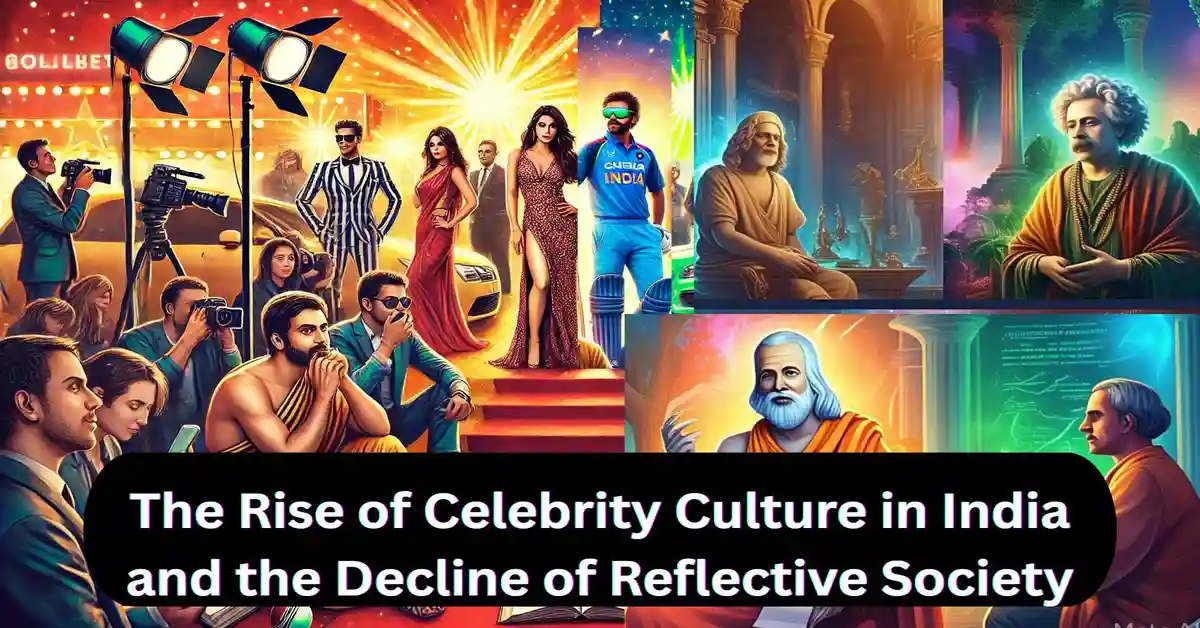The progress of any nation depends on the kind of priorities it emphasizes within its society. Does it encourage knowledge, scientific thinking, and innovation, or does it place more importance on entertainment, sports, and popularity? This is the essence of culture. Whether philosophy and science will evolve in a society or not is not merely a coincidence; it is determined by the culture of that society. In a society where thinkers or philosopher are respected and freedom of speech and thought is encouraged, people will naturally move towards becoming thinkers themselves.
In our country, the biggest crisis currently is the question of who receives respect. The answer is clear: film stars, cricketers. Why? While being an actor is certainly a good thing and significant, it is not so monumental that they should be the ones receiving the most respect. For a long time, it has been a topic of discussion in India that film stars, cricketers, and wrestlers receive excessive admiration, while scientists, teachers, and philosophers are relatively less recognized. In this article, we will delve deeply into how a society’s culture decides which professions will become the focal point of admiration.
The Influence of Culture on National Development
The structure of any society depends on which professions and personalities are given the most importance. For example, in ancient Greece, philosophers and scientists were held in high regard. Great thinkers and scientists like Aristotle, Plato, Socrates, and Hippocrates flourished during this period. Their influence is still evident worldwide today. This is proof that when a society places knowledge and intellectual thought at the highest level, great thinkers and scientists emerge from it.
In contrast, in modern Indian society, the focus is primarily on film actors, cricketers, and some administrative officers who receive the most respect. Even in schools and colleges, many students aspire to become cricketers, Bollywood stars, or government officers.
How Society’s Values Shape Our Heroes and Icons
Why should cricketers receive such a high level of respect, to the point that the entire nation pauses its daily activities to watch if a player hits a four or not? Imagine if doctors, scientists, and teachers were given this level of recognition—such respect could truly change the direction of the country.
Why is such high respect given to IAS or IPS officers? The truth is, they are merely district managers, similar to a manager in a company. They manage a district or a ministry, but their contribution to advancing civilization is limited. Unless thinkers are nurtured in society, new ideas, science, and technology will not develop, and society will remain stagnant.
Philosophy, Science, and Society: A Forgotten Legacy
Who receives respect in society is not a coincidence; it is determined by the culture. In a country where thinkers and scientists are honored, new scientists and philosophers will emerge. However, if only the collector, the SP, businessmen, cricketers, or film stars receive respect, then the dream of an educated, capable individual will also be to become one of them.
Is being an actor such a big deal that they deserve the love and respect of the entire country? A dialogue is given to an actor, who then reads it in front of a camera—and the audience applauds profusely for this. Similarly, cricketers receive undue importance in society. The entire nation halts its work to watch a cricket match, but does scientists, doctors, and teachers receive the same level of respect? If they did, the direction of the country could change.
Administrative Services vs. Scientific Contributions
In India, IAS and IPS officers also receive high respect. But what is the actual work of an IAS officer? They manage a district, much like a manager in a company who manages a department. Police officers are responsible for the safety of the state. This is an important role, but does it lead to the development of civilization? If philosophers, scientists, and teachers are given equal respect, they will bring new ideas, new technologies, and innovations, thereby advancing civilization.
Historical Perspective and Greek Civilization
In Greece, not only were philosophers respected, but scientists too. Aristotle was the first scientist, Herodotus is considered the first historian, and Hippocrates’ name is still used in the medical oath today. Between 600 BC and 400 AD, over 1000 years, Greece saw the rise of multiple scholars. There were specific conditions that allowed this to happen.
India also had a similar situation in the past, but now the respect for knowledgeable individuals is dwindling. In contrast, good singers, comedians, and actors are given more respect. When a society loses its respect for knowledge, fewer knowledgeable people will emerge.
Honoring Knowledge
If we want to make our society better, we must offer scientists, teachers, philosophers, and researchers the same respect that film stars and players currently enjoy. When a child sees that a scientist receives the same recognition as a cricketer, they will certainly be inspired to take an interest in science and research.
For this, we need reforms in the education system. Students should not be confined to just the syllabus but should be inspired toward research and innovation. Additionally, the media and the government need to work towards this cause so that scientists and teachers receive their due respect in society.
Conclusion
It is the priorities of a society that determine which professions will flourish in the future and who will become role models. If India aims to be a scientific and thoughtful nation, we need to bring about a change in our mindset. We must ensure that scientists, teachers, and researchers receive the same level of respect as a film star or cricketer. Only then can we build a developed and knowledge-based society.



This has been a really wonderful post. Many thanks for providing these details.